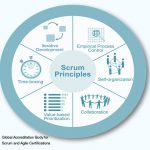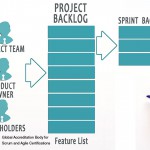The Guide to the Scrum Body of Knowledge (SBOK™ Guide) defines Scrum as an adaptive, iterative, fast and flexible framework designed to quickly deliver significant value during a project. Scrum ensures transparency in communication and creates an environment of collective accountability and continuous progress. Interestingly, applying Scrum successfully in a project also requires the human resource management practices of the organization where it is being implemented to be in sync with Scrum.
In Scrum, there are two types of roles:
Core Roles: They are involved in creating the product of the project, are committed to the project, and ultimately are responsible for the success of the project.
Non-core Roles: They are non-compulsory team members, who have an interest in the project, may interface with the team, but may not be responsible for the overall success of the project. The non-core roles should also be taken into account in any Scrum project.
Typically, most organizations find it hard to discard Taylor’s scientific management theory. But to make Scrum teams work successfully, HR has to give the cross-functional team a sense of responsibility and the control. After all, Scrum teams are expected to be self-motivated. They collaborate extensively to build products according to User Stories (users’ requirements), often conferring with the Product Owner who is ultimately responsible for the Scrum team’s business decisions. While executing a typical Sprint, team members develop a sense of co-ownership as they set shared goals and learn how to manage each other in order to achieve them. But the self-organizations of a Scrum Teams may be questioned when the team members are effected by performance appraisals, trying to impress managers and adhering to incentive schemes. This serves as a roadblock to Scrum’s core reasons of success: product-requirement alignment, feedback, self-motivation and morale. Along with the Scrum Master, it is also HR’s job to help the Scrum Team members achieve their aims.
Another area where HR’s role is important is during the appointment of the Scrum Master. Scrum Masters are the servant leaders of Scrum Teams. They moderate and facilitate team interactions. They are responsible for solving team member problems and ensuring the Scrum Team has a productive environment conducive to their work. They guard the Scrum Team from external influences and enforces Scrum processes. They also act as the Scrum Team’s coach and motivator. Hence, it is important to find the right candidate for the job. One of the most common mistakes HR makes when helping select the Scrum Master is assuming that a manager is the default choice for the Scrum Master. Managers usually work in a boss-subordinate leadership style rather than being a servant leader. So when a manager is appointed as a Scrum Master for a team that includes professionals who used to be his or her subordinates, they continue to regard the Scrum Master as a manager rather than managing the Scrum Team between themselves.
The Product Owner, on the other hand, requires a certain level of authority associated with his role. As Product Owners, the managers tend to get better results for each sprint out of their team members.
Effective Scrum requires longstanding, cross-functional teams. Progressive HR policies will allow Scrum Teams to handpick their own members within appropriate HR guidelines.










